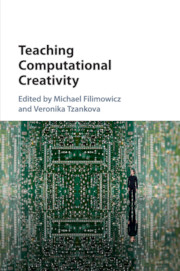Book contents
- Teaching Computational Creativity
- Teaching Computational Creativity
- Copyright page
- Contents
- Figures
- Tables
- Notes on Contributors
- Acknowledgments
- Introduction: Pedagogies at the Intersection of Disciplines
- PART I NEW FOUNDATIONS
- PART II CODE AS MEDIUM
- PART III PHYSICAL{LY} COMPUTING
- PART IV ONLINE LEARNING
- PART V CRITICAL PEDAGOGY
- 9 Process and Outcome Paradigms in Media Arts Pedagogy
- 10 Citizens of the Cognisphere
- PART VI TRANSDISCIPLINARY
- Interviews
- Afterword: Toward a Curricular Synthesis
- Index
- References
9 - Process and Outcome Paradigms in Media Arts Pedagogy
from PART V - CRITICAL PEDAGOGY
Published online by Cambridge University Press: 04 July 2017
- Teaching Computational Creativity
- Teaching Computational Creativity
- Copyright page
- Contents
- Figures
- Tables
- Notes on Contributors
- Acknowledgments
- Introduction: Pedagogies at the Intersection of Disciplines
- PART I NEW FOUNDATIONS
- PART II CODE AS MEDIUM
- PART III PHYSICAL{LY} COMPUTING
- PART IV ONLINE LEARNING
- PART V CRITICAL PEDAGOGY
- 9 Process and Outcome Paradigms in Media Arts Pedagogy
- 10 Citizens of the Cognisphere
- PART VI TRANSDISCIPLINARY
- Interviews
- Afterword: Toward a Curricular Synthesis
- Index
- References
Summary
This chapter explores process and outcomes paradigms in media arts pedagogy in the context of new media information and communications technologies (ICTs) and the “contested” Internet – the highly controlled, surveilled, and commercialized networks we use. The paradigmatic notions of pedagogy as either process-based (Dewey) or outcomes-oriented (Niebuhr) are discussed in connection to studio-based learning. Process-based approaches to education have been dominant in the twentieth century and were developed by Dewey, Vygotsky, Schön, Kolb, and many others, while outcomes-oriented education developed later in the period. Originating with sociologist William Spady, outcomes-based education (OBE) (1994) has been implemented as an administrative tool both for measuring individual performance as well as course or program level assessments. Performance “metrics” in outcomes initiatives emphasize peer review and measurement, de-emphasizing flexible approaches such as allowing individual students to assess according to their own goals. This chapter draws on Niebuhr rather than Dewey for expanding OBE frameworks for the use of ICTs in media arts project-based learning. Students are technologically enabled in project-based learning to become agents of their own goals and learning agendas since ICTs provide capabilities for individually tailored learning experiences which contextualize knowledge and assist in developing informed Internet citizenship.
- Type
- Chapter
- Information
- Teaching Computational Creativity , pp. 213 - 228Publisher: Cambridge University PressPrint publication year: 2017



